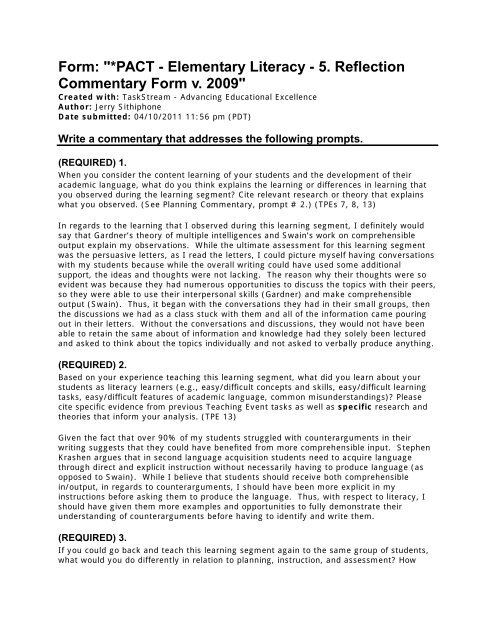Example 1
Example 1
Example 1
Create successful ePaper yourself
Turn your PDF publications into a flip-book with our unique Google optimized e-Paper software.
Form: "*PACT - Elementary Literacy - 5. Reflection<br />
Commentary Form v. 2009"<br />
Created with: TaskStream - Advancing Educational Excellence<br />
Author: Jerry Sithiphone<br />
Date submitted: 04/10/2011 11:56 pm (PDT)<br />
Write a commentary that addresses the following prompts.<br />
(REQUIRED) 1.<br />
When you consider the content learning of your students and the development of their<br />
academic language, what do you think explains the learning or differences in learning that<br />
you observed during the learning segment? Cite relevant research or theory that explains<br />
what you observed. (See Planning Commentary, prompt # 2.) (TPEs 7, 8, 13)<br />
In regards to the learning that I observed during this learning segment, I definitely would<br />
say that Gardner’s theory of multiple intelligences and Swain’s work on comprehensible<br />
output explain my observations. While the ultimate assessment for this learning segment<br />
was the persuasive letters, as I read the letters, I could picture myself having conversations<br />
with my students because while the overall writing could have used some additional<br />
support, the ideas and thoughts were not lacking. The reason why their thoughts were so<br />
evident was because they had numerous opportunities to discuss the topics with their peers,<br />
so they were able to use their interpersonal skills (Gardner) and make comprehensible<br />
output (Swain). Thus, it began with the conversations they had in their small groups, then<br />
the discussions we had as a class stuck with them and all of the information came pouring<br />
out in their letters. Without the conversations and discussions, they would not have been<br />
able to retain the same about of information and knowledge had they solely been lectured<br />
and asked to think about the topics individually and not asked to verbally produce anything.<br />
(REQUIRED) 2.<br />
Based on your experience teaching this learning segment, what did you learn about your<br />
students as literacy learners (e.g., easy/difficult concepts and skills, easy/difficult learning<br />
tasks, easy/difficult features of academic language, common misunderstandings)? Please<br />
cite specific evidence from previous Teaching Event tasks as well as specific research and<br />
theories that inform your analysis. (TPE 13)<br />
Given the fact that over 90% of my students struggled with counterarguments in their<br />
writing suggests that they could have benefited from more comprehensible input. Stephen<br />
Krashen argues that in second language acquisition students need to acquire language<br />
through direct and explicit instruction without necessarily having to produce language (as<br />
opposed to Swain). While I believe that students should receive both comprehensible<br />
in/output, in regards to counterarguments, I should have been more explicit in my<br />
instructions before asking them to produce the language. Thus, with respect to literacy, I<br />
should have given them more examples and opportunities to fully demonstrate their<br />
understanding of counterarguments before having to identify and write them.<br />
(REQUIRED) 3.<br />
If you could go back and teach this learning segment again to the same group of students,<br />
what would you do differently in relation to planning, instruction, and assessment? How
















